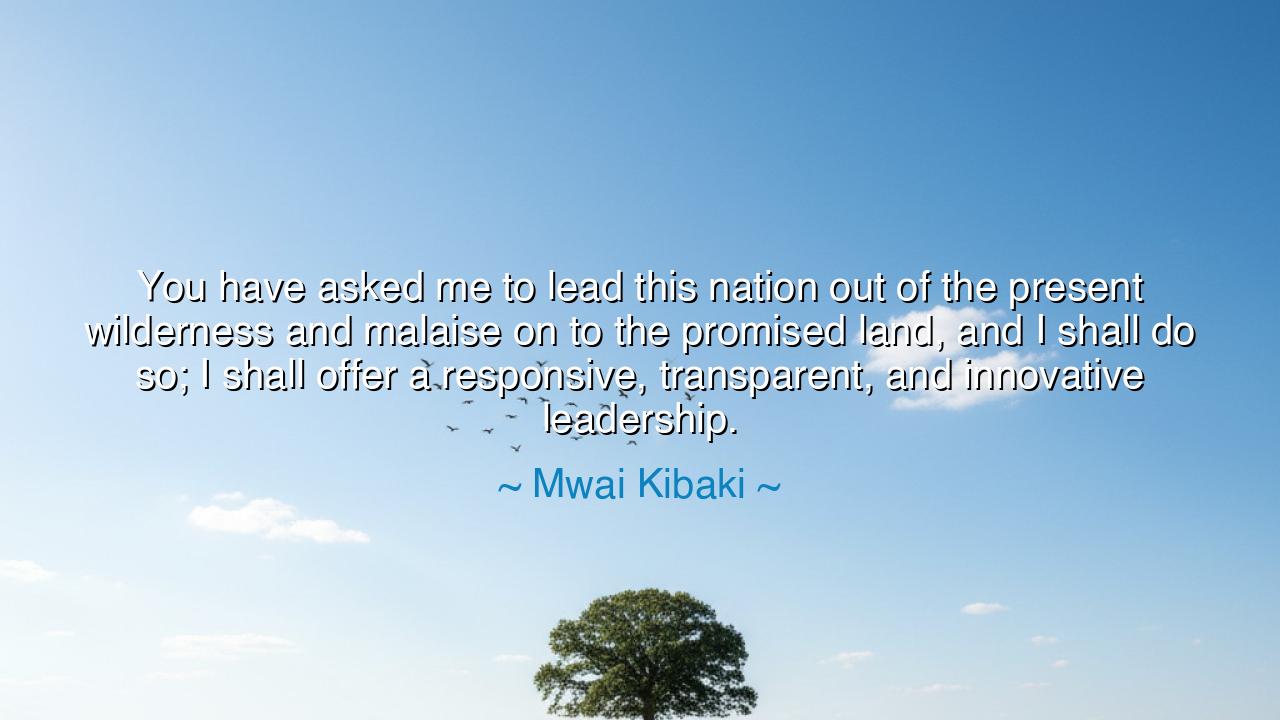
You have asked me to lead this nation out of the present
You have asked me to lead this nation out of the present wilderness and malaise on to the promised land, and I shall do so; I shall offer a responsive, transparent, and innovative leadership.






The words of Mwai Kibaki—“You have asked me to lead this nation out of the present wilderness and malaise on to the promised land, and I shall do so; I shall offer a responsive, transparent, and innovative leadership.”—resound like the pledge of a shepherd to his flock, a vow forged in the fires of struggle and carried upon the winds of hope. They were spoken at a moment of transition in Kenya’s history, when the people yearned to cast off the shadows of corruption and despair, and to stride toward renewal. These words are not merely political speech; they are a covenant between leader and people, echoing the timeless struggle of nations to move from darkness into light.
When Kibaki speaks of the wilderness and malaise, he names the trials of a land weighed down by disillusionment. The wilderness is not only of deserts and forests but of spirit—where trust in governance has withered, and the people wander, searching for direction. The malaise is the weariness of citizens who have suffered long under systems that stifle rather than sustain. To acknowledge this wilderness is to tell the truth; to promise a way out is to call the nation to rise together.
He invokes the promised land, a phrase steeped in sacred history. Just as Moses led the Israelites from bondage into a land of milk and honey, Kibaki casts his leadership as a journey of liberation—from stagnation to progress, from despair to hope, from broken trust to restored dignity. Such imagery is powerful, for it binds political leadership to spiritual destiny. It says to the people: “Your struggle is not in vain; your sacrifices are the path to something greater.” In this way, his vow is not only about governance but about renewal of the soul of a nation.
The pledge of responsive, transparent, and innovative leadership is a radical promise, for in those words are the foundations of just rule. Responsiveness demands a leader who listens, who does not rule from lofty towers but bends an ear to the cries of the people. Transparency demands honesty, the light of truth cutting through the fog of secrecy and corruption. Innovation demands courage, the will to abandon broken systems and embrace new ways of building prosperity. In this triad lies the blueprint for any society that seeks not only to survive but to thrive.
History gives us many examples of such leadership, but consider the tale of Abraham Lincoln, who in America’s darkest hour—the Civil War—spoke not to divide but to heal. He, too, led his people out of wilderness: the wilderness of fratricide, the malaise of slavery, the despair of a fractured union. By patience, vision, and unyielding courage, he brought forth a new birth of freedom. Kibaki’s words stand in the same lineage: leaders who call their people to endure the storm because beyond it lies the dawn.
The lesson for us is clear: a people must never cease to demand such leadership, and leaders must never shrink from offering it. The wilderness will always return in different forms—corruption, division, ignorance, apathy—but the path to the promised land is the same: honesty, listening, and courage to create anew. Each citizen, too, carries part of this leadership, for nations are not guided by one alone but by the collective choices of their people.
So what actions must we take? First, we must hold our leaders accountable to the pledges they speak, for words are easy but fidelity to them is rare. Second, we must cultivate within ourselves the same qualities we seek in rulers—responsiveness to the needs of others, transparency in our dealings, innovation in the face of problems. For a nation is but a reflection of its people, and if the people are upright, the leadership will not long remain corrupt.
Therefore, O listener, let Kibaki’s vow be more than a memory of a moment in Kenya’s history. Let it be a call to every generation: to rise from wilderness, to reject malaise, and to labor together toward the promised land of justice, dignity, and renewal. Leadership is not only the crown of presidents but the duty of every soul that longs for a better tomorrow. Walk in that spirit, and you, too, will help carry your people from shadows into light.






AAdministratorAdministrator
Welcome, honored guests. Please leave a comment, we will respond soon